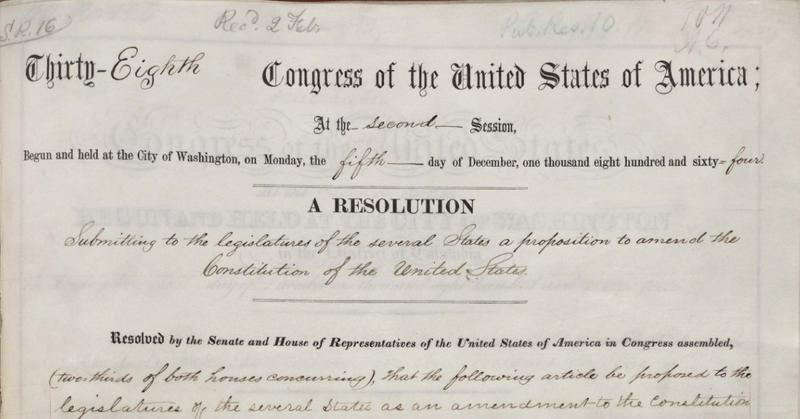13th Amendment To The U.S. Constitution: What It Looked Like When Slavery Ended
By | January 29, 2021

On January 31, 1865, Congress ratified the 13th Amendment to the United States Constitution, formally abolishing the institution of slavery and involuntary servitude across all states. Despite the major impact it had on the country, the amendment itself is fairy simple. "Neither slavery nor involuntary servitude, except as a punishment for crime whereof the party shall have been duly convicted, shall exist within the United States or any place subject to their jurisdiction," it reads.
"But wait," you might be thinking. "Didn't the Emancipation Proclamation free the slaves?" Well, yes and no. The Emancipation Proclamation of June 1, 1863 wasn't a law so much as a presidential order, and it only applied to those slaves living in states that were rebelling at the time. However, Southern slave owners saw no reason to heed President Lincoln's words, what with the whole secession thing, and continued exploiting their slaves while those in the North and West were left out completely. In reality, the Emancipation Proclamation freed almost nobody, but it did have major positive impacts on the war effort, including allowing black soldiers into Union forces and creating safety for fleeing slaves.

Ratification Blues
Once the Civil War was won by the Union, Lincoln didn't want to take any chances with Southern states voting down the 13th Amendment as they were restored to the United States, so he pushed for its passage only a few weeks later in April 1964. While the Senate passed it with ease, the House of Representatives put up some resistance. It wasn't until Lincoln's successful reelection, during which he promised the "utter and complete destruction" of slavery, that the House finally approved in January 1865.
While winning the war and passing the 13th Amendment were Lincoln's finest accomplishments, he unfortunately didn't get to see the amendment fully ratified, as he was shot and killed by John Wilkes Booth while attending a play on April 15, 1865. The newly created President Andrew Johnson subsequently required Southern states to ratify the amendment, which needed 27 of the existing 36 states to be properly ratified, as a condition of being let back into the United States. Georgia was the final state needed, and on December 6, 1865, the 13th Amendment was cemented into the Constitution, which made it the law of the land despite the fact that it took some states until the 1990s to formally ratify (looking at you, Mississippi).

The Criminal Clause
Although the 13th Amendment is widely seen as one of the most important laws in American history, it has its loopholes, specifically with regards to the "except as a punishment for crime whereof the party shall have been duly convicted" part. As a result, "black codes" immediately began to rise throughout the South. These were laws which controlled things like intermarriage and property ownership for black Americans while also criminalizing petty things like loitering, vagrancy charges for the unemployed, and even swearing. Nearly overnight, prison demographics radically shifted. In Louisiana, for example, the inmate population shifted from two-thirds white to two-thirds black during the 1860s.
While particular laws varied from state to state, they were systematically designed to suppress the black vote, keep the black community in poverty, and most importantly, feed newly freed black citizens into the prison system so their labor could be legally exploited. For instance, if you lived in Mississippi (sorry to harsh on the state so hard, but it really sucked) under laws against such vague charges as "neglecting job or family" and lost your job, your local law enforcement might view that as neglect of job and family. You would appear in front of an all-white jury (black citizens weren't allowed to serve) and get convicted and fined, but because you didn't have a job and couldn't pay your fine, you would be forced to work off your debt to the state through labor.
Thankfully, the black codes didn't last, but the era of segregation and Jim Crow still made it easy to target and overcharge the black population and thereby swell the prison population across the United States. For example, Alabama's prison population—which was a whopping 90% black—tripled in the mid 1870s. At the turn of the 20th century, there was some pushback against the targeted overcharging, but despite some efforts by the Department of Justice and the end of the widespread use of chain gangs in the 1950s, the trend continued.

The Future Of The 13th Amendment
Whatever the writers of the 13th Amendment intended when they created the "criminal clause," its time appears to be up. Recently, federal lawmakers have pushed resolutions to take the clause out of the amendment. While perhaps imperfect, however, the power of this amendment should be celebrated. In combination with the 14th and 15th Amendments, which formalized citizenship and supported the right to vote, it's integral to America's freedom and democracy.

